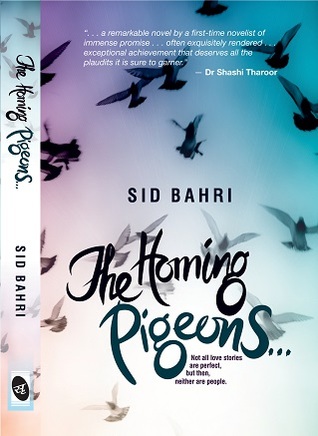About the book:
In the middle of the catastrophic 2008 recession, Aditya, a jobless, penniless man meets an attractive stranger in a bar, little does he know that his life will change forever
When Radhika, a young, rich widow, marries off her stepdaughter, little does she know that the freedom that she has yearned for is not exactly how she had envisioned it.
They say Homing Pigeons always come back to their mate, no matter where you leave them on the face of this earth. Homing Pigeons is the story of love between these two unsuspecting characters as it is of lust, greed, separations, prejudices and crumbling spines.
About the Author:
Book Trailer:
My Review:
“It is always
difficult for a person with a job to empathize with someone who doesn't.”
Clearly, the author reads the minds of humans adeptly. Though not unusual, a
debut author having a deep insight into human psychology is a welcome change,
specially when this insight deploys itself to use not just over the hardihood
and impudence of youth, but also a meaningless, hollow adulthood.
As the product of this insight, the author
presents to you two identifiable,
fallible characters: Radhika and Aditya.
Since in the deep dungeons of a debt-ridden
life, there is little respite, our male protagonist turns out to be a typical
professional-out-of-job-spending-fortune-drowning-sorrow in pegs of alcohol,
thereby clouding his thinking while ironically seeking to cleanse it. Then we
have the other imperfect protagonist Radhika, who seems to fallen in every
possible misfortune, not on account of ill-fate, but by virtue of indecision.
Coming from a debut author, this is a
remarkable, if not stellar piece of work, in that he manages to somehow create
people out of those characters, and not just hollow puppets compelled to
perform as the writer has suggested. That is the gem in this work: It has been
written so convincingly that it just skips your mind that it has an extremely
contemporary plot, which has all the cons of having an overdose of three
quirks: lust, greed and indecision.
Alternating between narrations by the two
of them, the reader is transported through the various stages in their lives at
an immaculately panoramic mode. However, the fact that the fallibility and
imperfection is every now and then highlighted only by the breach of moral
conduct, lack of a moral conscience and indecision as regards their physical
relationships is a bit of a put-off.
 Nevertheless, it has many such
heart-rending instances whereby the reader earnestly wishes to sympathize with
the characters who have for long been living a life of compromise. Because,
“this is the reward for leading a loveless life”. Indeed, the author weaves
expressive, analeptic soliloquy and assuaging monologues much to the reader's fulfillment.
Nevertheless, it has many such
heart-rending instances whereby the reader earnestly wishes to sympathize with
the characters who have for long been living a life of compromise. Because,
“this is the reward for leading a loveless life”. Indeed, the author weaves
expressive, analeptic soliloquy and assuaging monologues much to the reader's fulfillment.
There are moments when the reader is
compelled to put down the book and, wearing a toothy smirk, contemplate; for
instance when the male lead says, “Many complications in my life occurred when
I enhanced my vocabulary to include words like guilt, morals and cheating.
Ignorance is definitely more blissful.” or “I guess God is a little convoluted.
He does not always favor good people.” It is only later that the whole relevance
of these confessions is perceptible to the reader.
With a cathexis in all acts of
protagonists, it makes even the ugly bearable.
Amidst countless revelations of the reality
of (read: sham) NGOs, of the fickle-mindedness of human beings, of the agony
and mirth of re-starting one's life et al, is a far momentous sequence of
emotions: love, followed by practicality, quandary, repentance and finally
atonement for the follies.
Best line: If that wasn't love, then maybe
love didn't exist.
I wondered how simple life would be if
there was no currency. No notes made of paper or plastic that differentiated
between people. Or if there had to be a currency, then why it couldn't just be
love?
The ending is abrupt, somehow the plot
appears predictable and repetitive, but the presentation is so raw, jacose,
amusing, and umbriferous of dingy realities, that a reader cannot help but feel
a “book hangover” upon parting with it.




